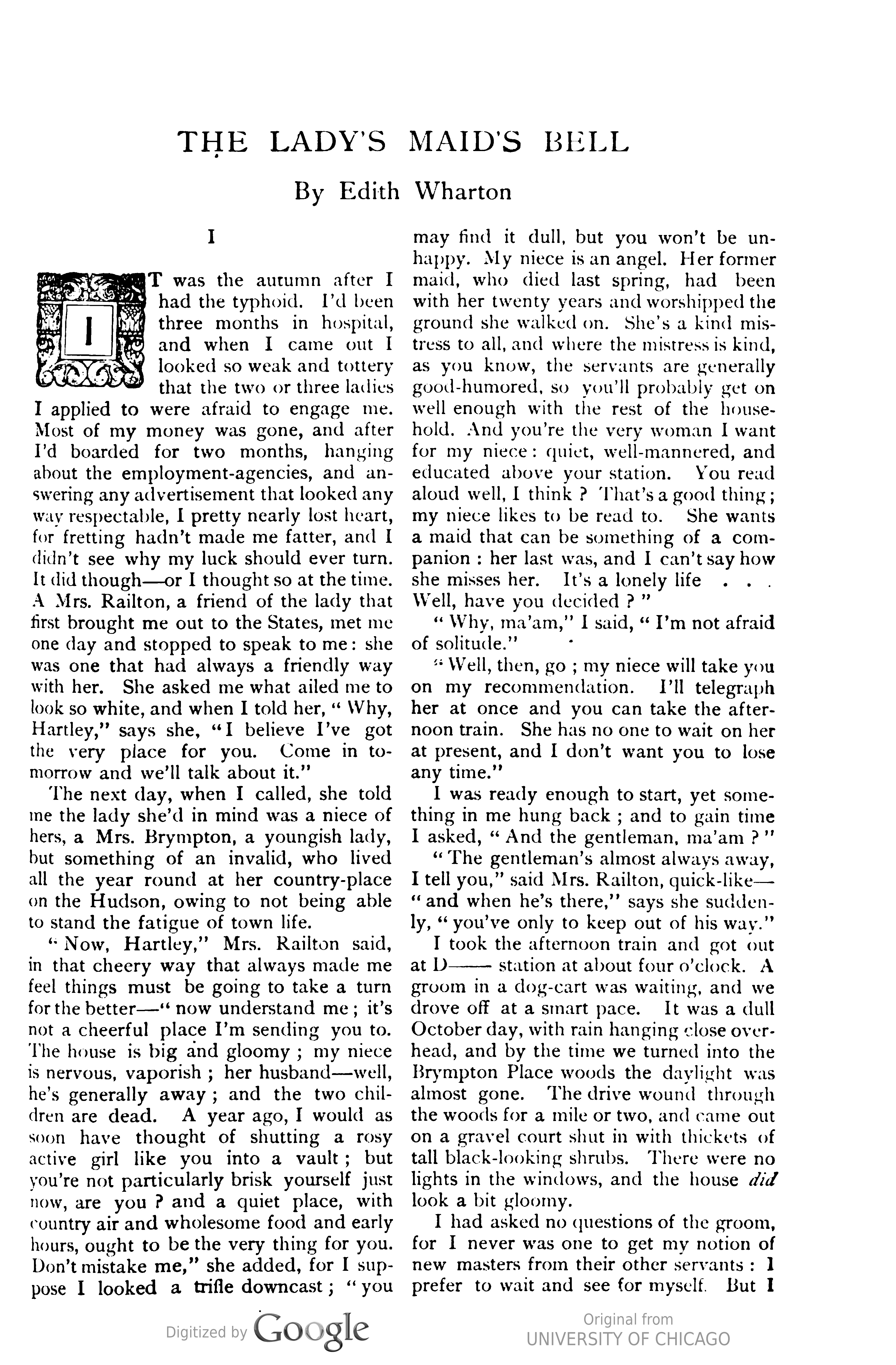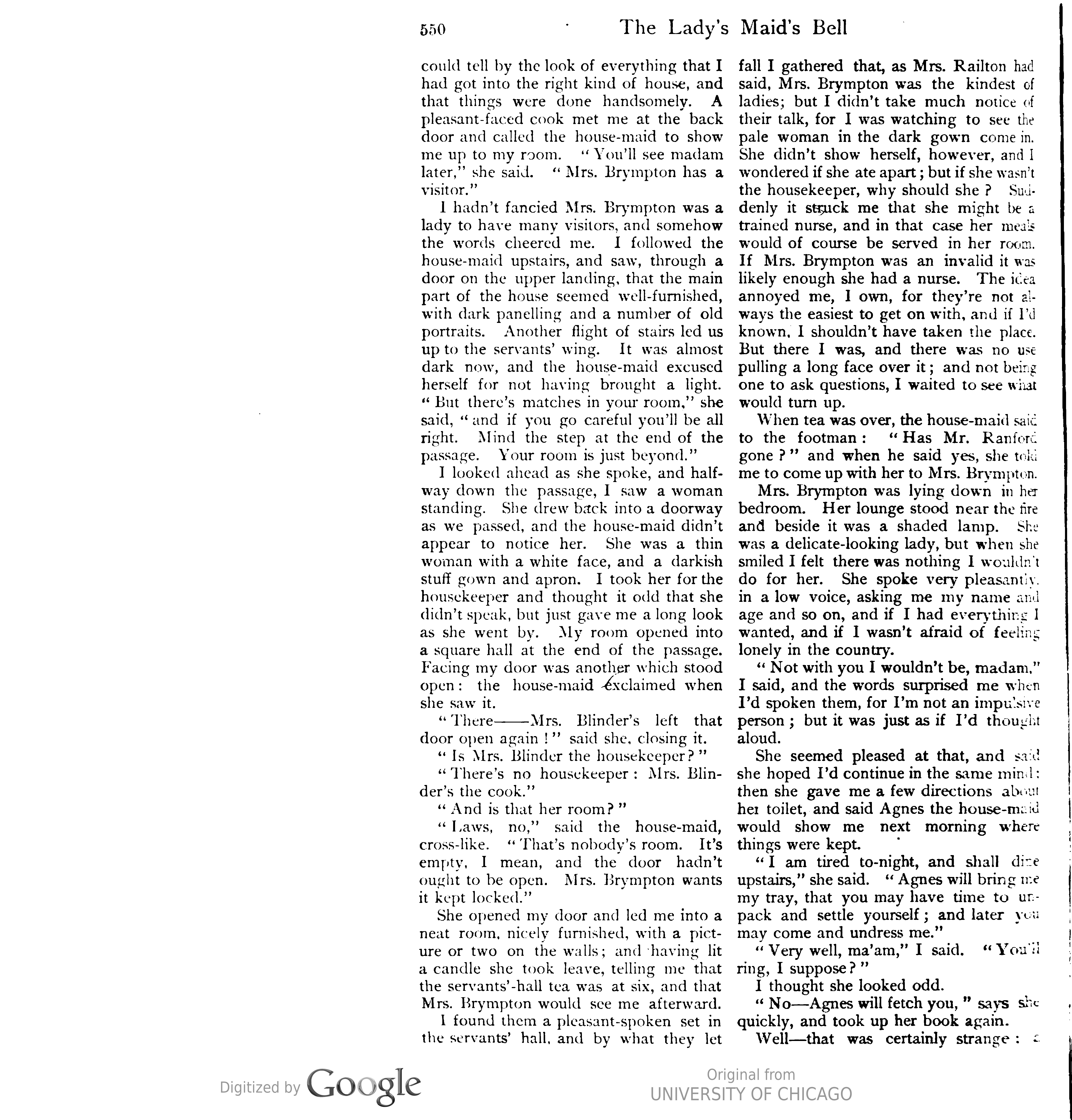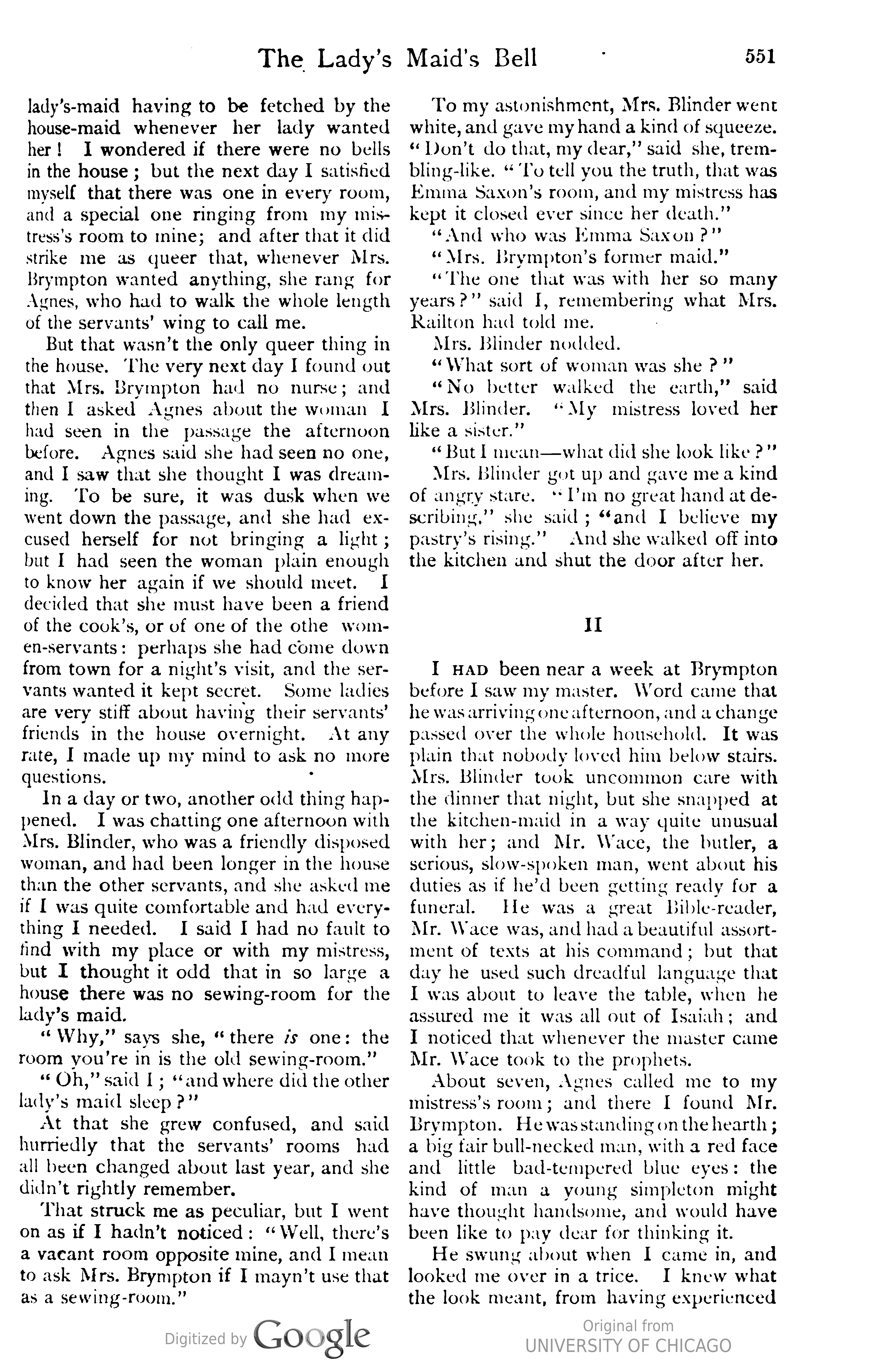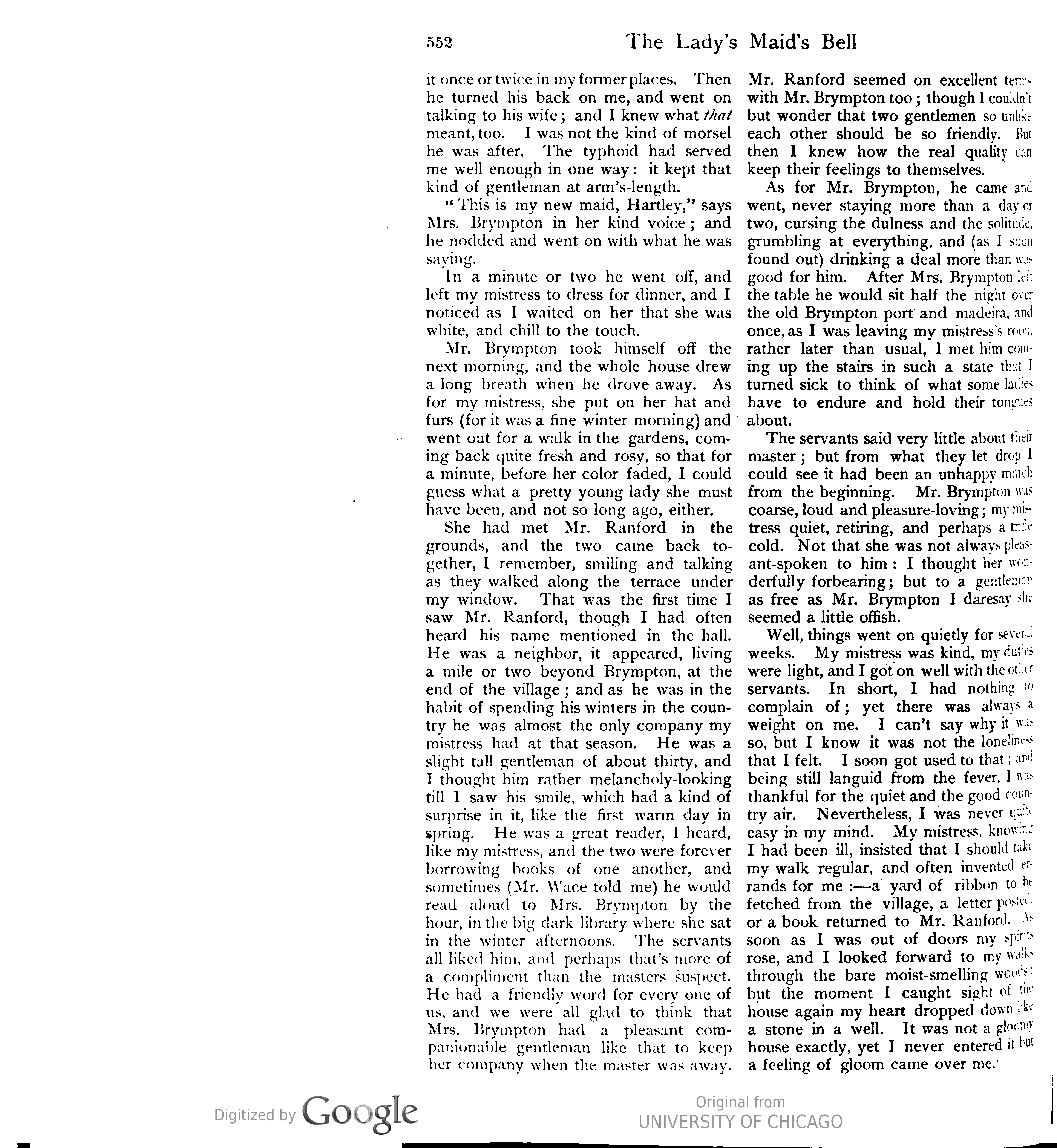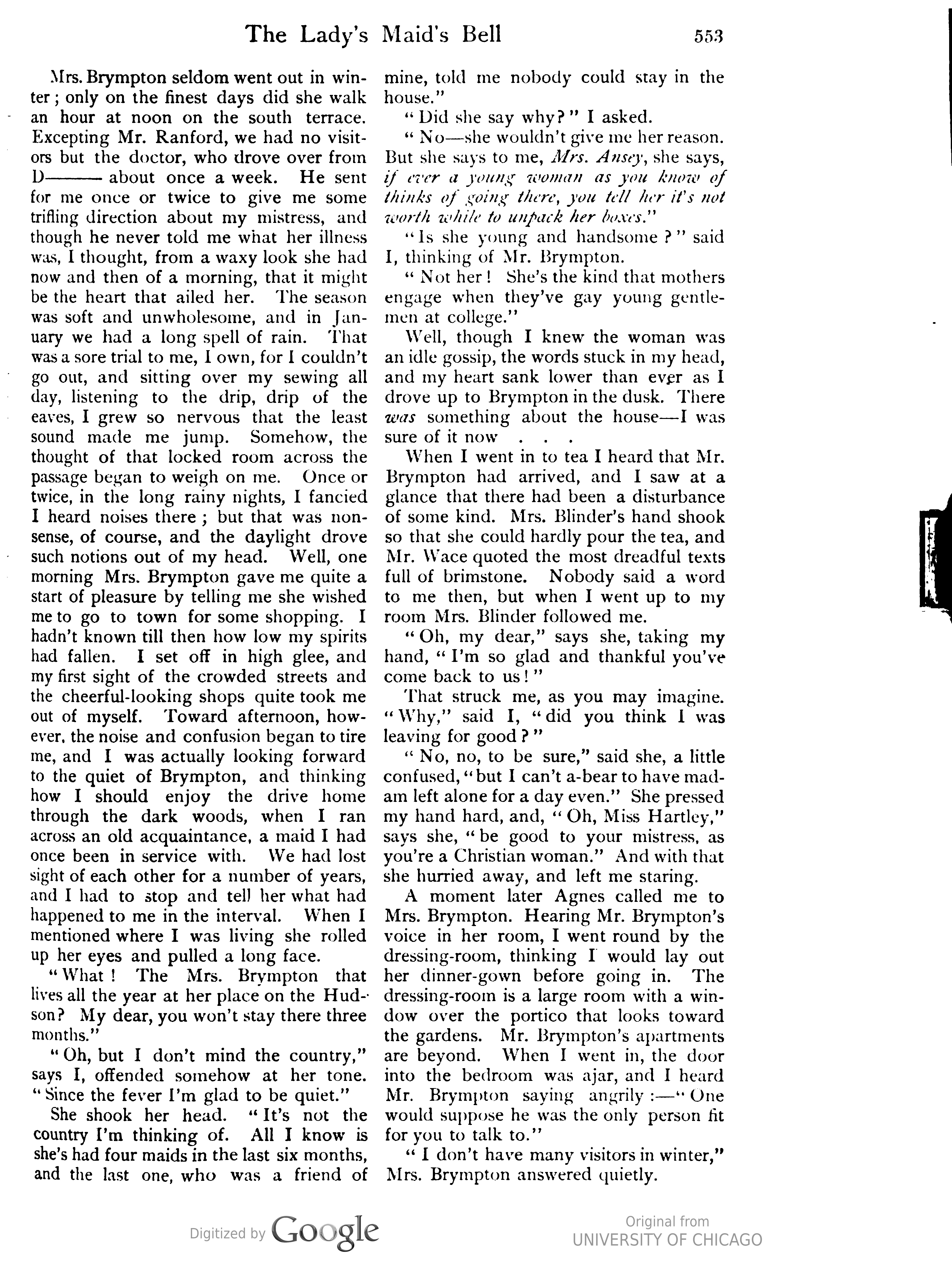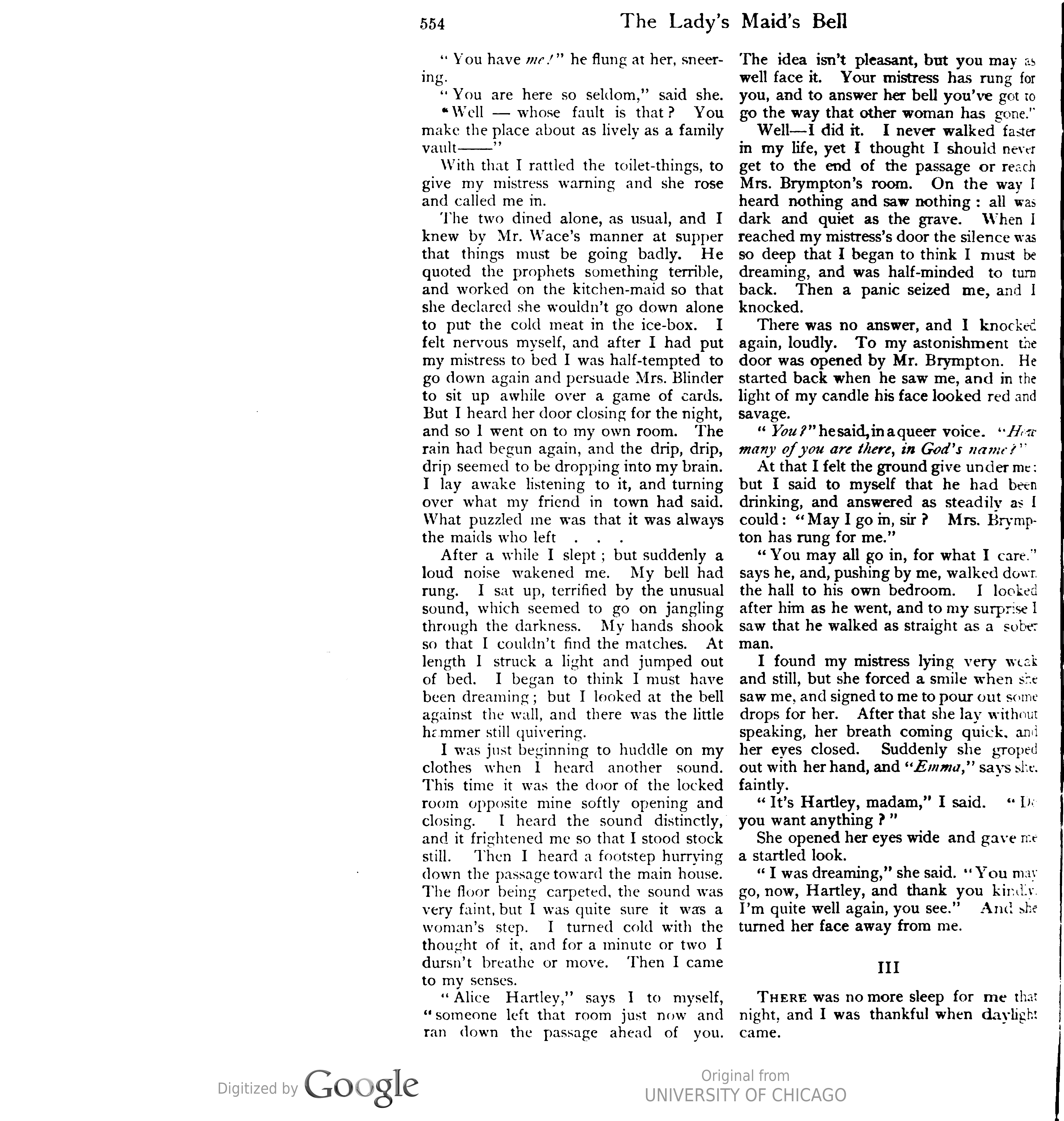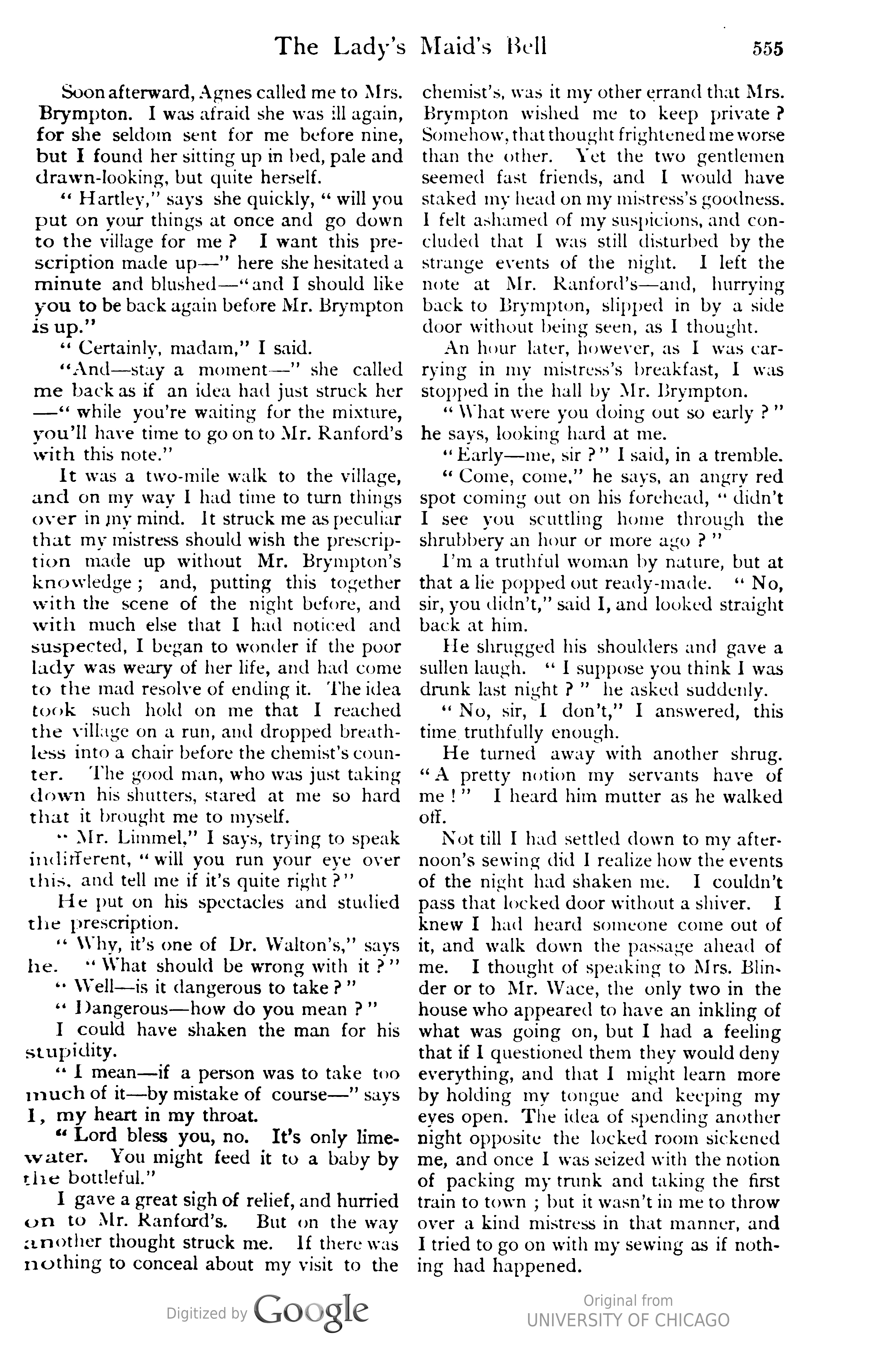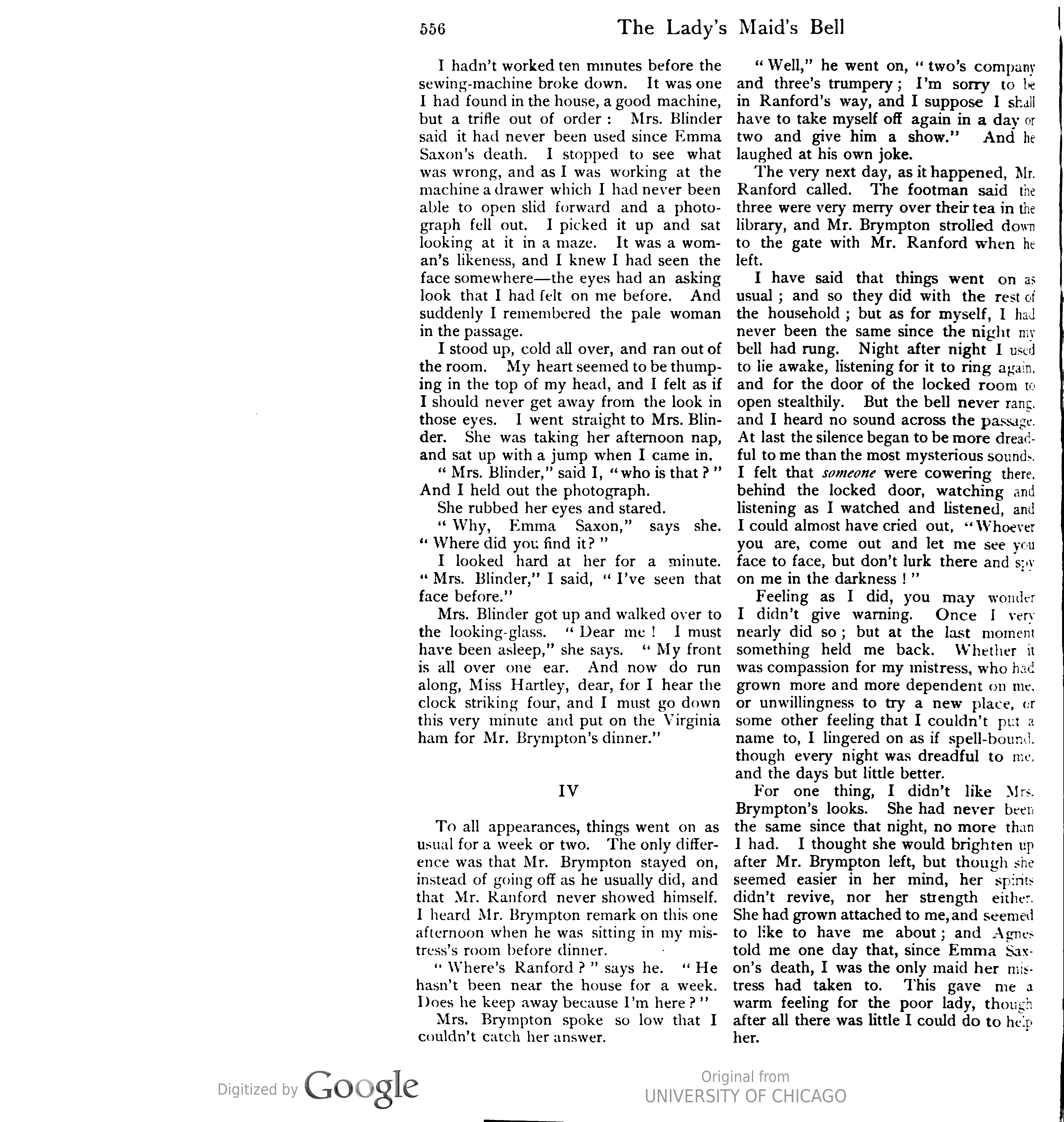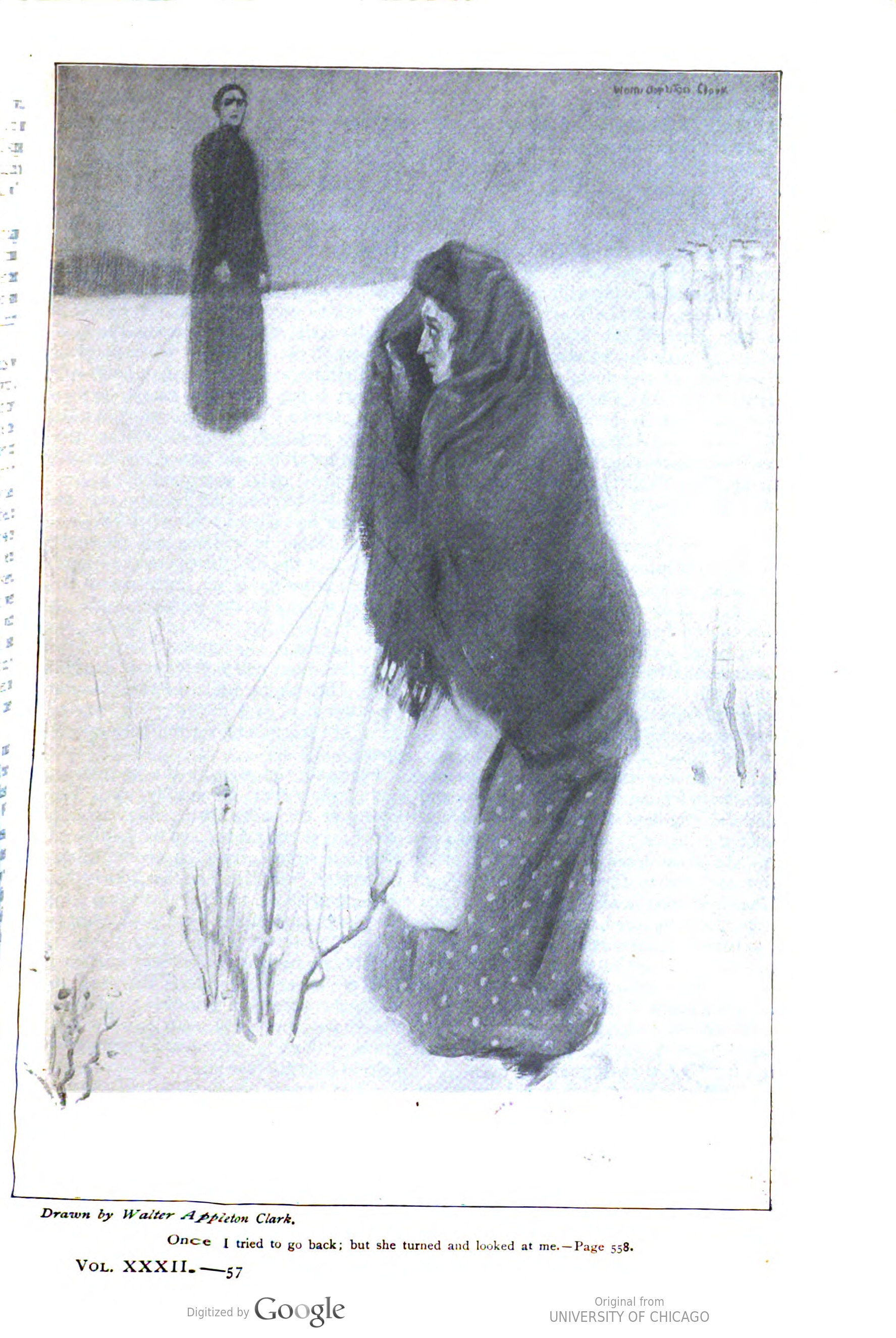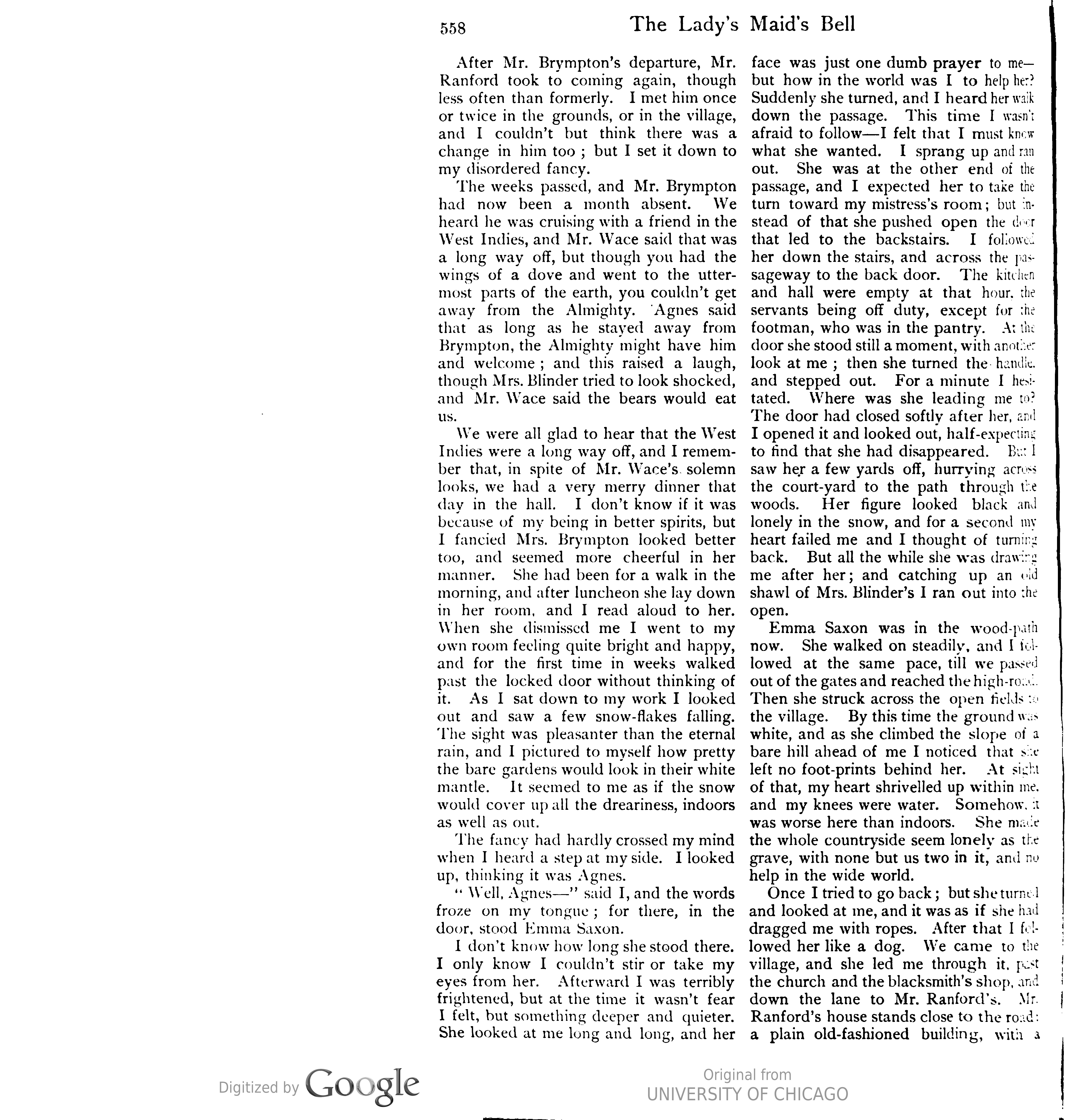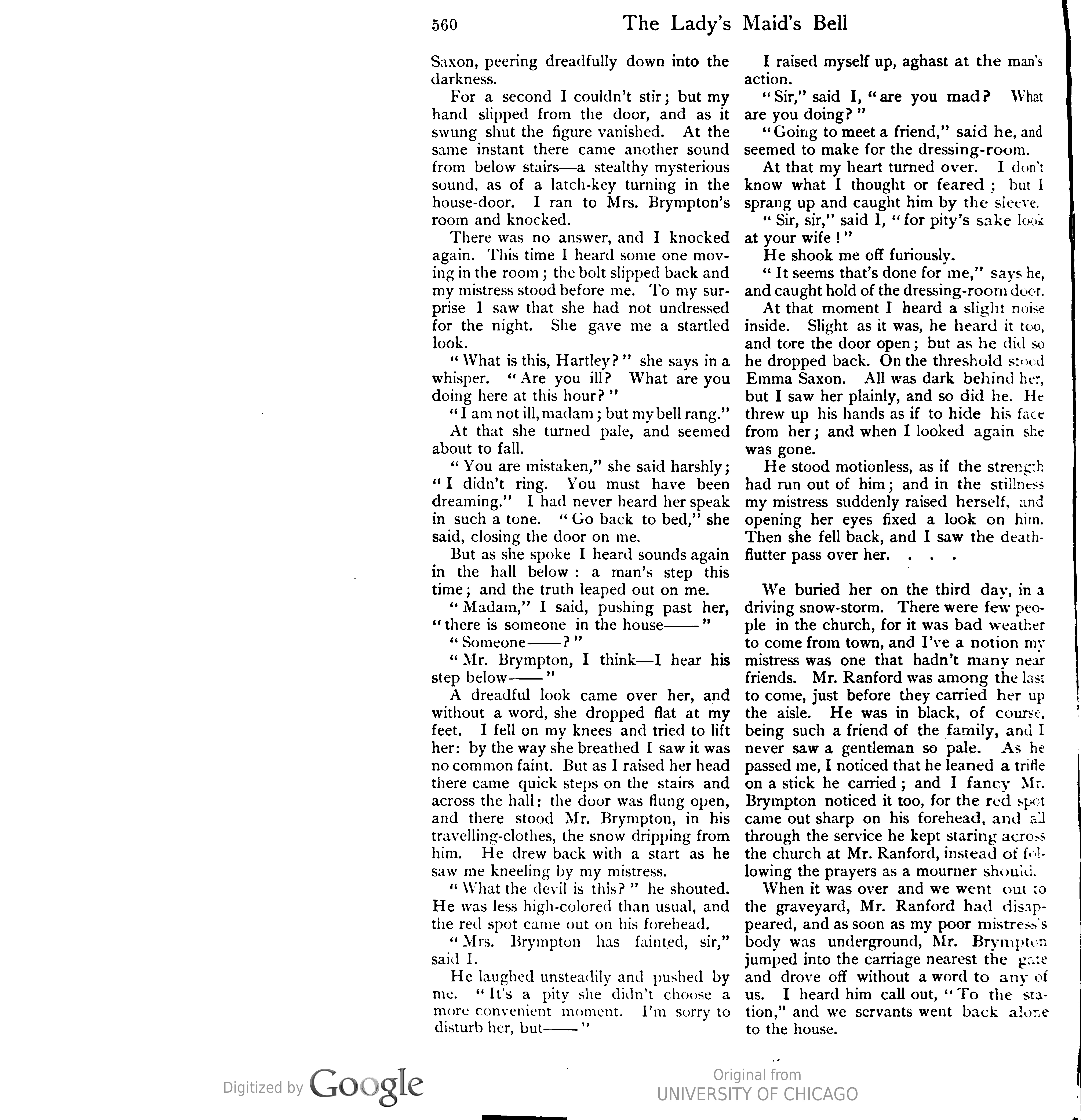"The Lady’s Maid’s Bell"
By
Edith Wharton
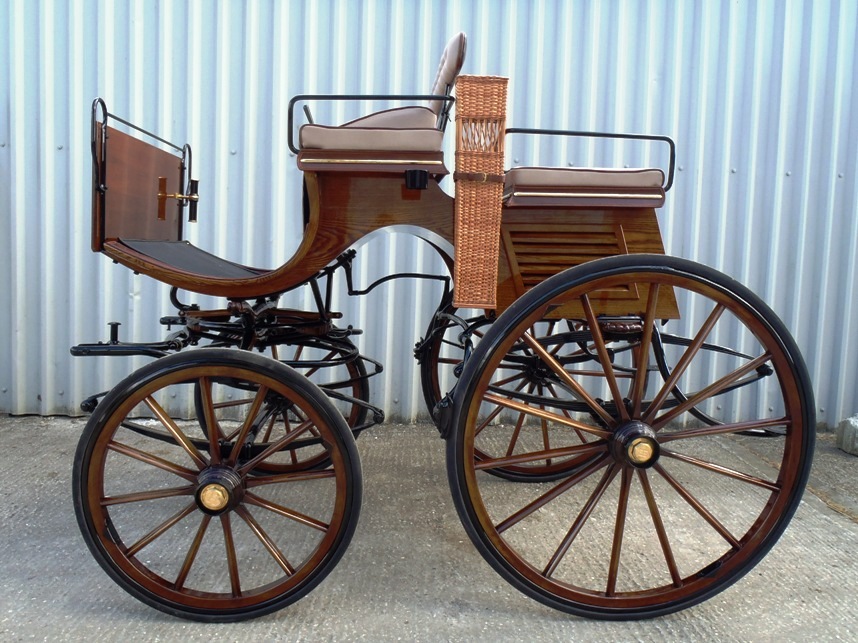 Source: https://www.nationaltrustcollections.org.uk/object/272875.1"Large, four-wheeled carriages for a single, pair or team of horses,
driven by grooms who also manage the stables. They are named as such,
because they were originally designed to carry not only passengers, but also
dogs. They perform well on country terrain, so were very popular with
country estates, even in the age of motor vehicles" (
National Trust).
According to the UK National Trust, a dog cart was a "large, sporting, four-wheeled
carriage," considered "the ultimate" conveyance of the time. They are named
"dog carts" because they were used to convey hunting dogs across the
countryside. The image included here, from Hartland Carriages, shows a back-to-back dog cart. - [EP]footmanA
uniformed worker with duties such as setting and waiting tables, serving food,
clearing tables, opening and closing doors, and carrying luggage (PBS). - [EP]bellsCountry
house design of this era typically included a servant’s hall, located in a
separate wing of the house. This required a bell to be used by members of the
household to summon staff for a wanted service. Bell types included sprung
bells, bell pulls and electric bells (National Trust). - [EP]huddleTo
huddle
usually means to gather in a cluster or group but it also meant "to put on
(clothes) with careless haste," an outdated expression today. - [ALB]IndiesThe
West Indies--a name given to the area by the British who had a notable colonial
presence there--are a chain of islands in the Caribbean Sea and Atlantic Ocean,
stretching from the Bahamas to the northern tip of South America, an attractive
holiday destination with a warm climate and beautiful beaches. It includes 13
independent island countries and hundreds more smaller dependencies located in
three major Archipelagos: the Greater Antilles, the Lesser Antilles, and the
Lucayan Archipelago (Britannica). - [ALB]backstairsIn a castle or a large manor house it was very important
for the servants to keep out of sight, to be able to come and go without
disturbing their employers. They were not allowed to use the traditional
hallways and staircases but had their own passageways and backstairs.
Inconspicuous doors in the public rooms led to their servants hallways and
kitchens, whereby they entered as quietly and unobtrusively as possible to serve
their employers. - [ALB]blacksmithA metalsmith who works with wrought iron or steel using
red hot fire to heat and shape the metal, makes repairs, tools and objects from
weapons to decorative iron grates. Horseshoes are made by blacksmiths called
farriers. Up until about the beginning of the 20th century, this shop was a
common sight in farming and rural areas and in towns and villages. Today,
artisans have revived this ancient tradition (Alamy). - [ALB]pluckedThis is an old fashioned expression, also used in Shakespeare’s Much Ado About Nothing, meaning to force yourself to
become brave enough to do something; to summon courage (Idiom Origins). - [ALB]baizeReference most often used in regard to servants. It is a sturdy green wool
cloth that is attached to the side of a swing door. Popular during the mid-18th
and 19th century, also in Jane Austen’s world, this insulating fabric prevented
noises from disturbing individuals on either side. It also refers to the
metaphorical dividing line between two domains, master and servant (Baize Wool Fabrics). - [ALB]thresholdIn Gothic tales it is the liminal space between good and evil. Liminal comes
from the Latin limen, which literally means "threshold." It refers to someone or
something being on a boundary between two things - often two extremes, like a
transitory, 'in-between' state. Manuel Aguirre (Liminal Terror: The Poetics of
Gothic Space), a literary critic, cites liminality as a defining feature of
Gothic literature. Doors and windows are often literal and metaphorical
thresholds (Gothic Library). - [ALB]
Source: https://www.nationaltrustcollections.org.uk/object/272875.1"Large, four-wheeled carriages for a single, pair or team of horses,
driven by grooms who also manage the stables. They are named as such,
because they were originally designed to carry not only passengers, but also
dogs. They perform well on country terrain, so were very popular with
country estates, even in the age of motor vehicles" (
National Trust).
According to the UK National Trust, a dog cart was a "large, sporting, four-wheeled
carriage," considered "the ultimate" conveyance of the time. They are named
"dog carts" because they were used to convey hunting dogs across the
countryside. The image included here, from Hartland Carriages, shows a back-to-back dog cart. - [EP]footmanA
uniformed worker with duties such as setting and waiting tables, serving food,
clearing tables, opening and closing doors, and carrying luggage (PBS). - [EP]bellsCountry
house design of this era typically included a servant’s hall, located in a
separate wing of the house. This required a bell to be used by members of the
household to summon staff for a wanted service. Bell types included sprung
bells, bell pulls and electric bells (National Trust). - [EP]huddleTo
huddle
usually means to gather in a cluster or group but it also meant "to put on
(clothes) with careless haste," an outdated expression today. - [ALB]IndiesThe
West Indies--a name given to the area by the British who had a notable colonial
presence there--are a chain of islands in the Caribbean Sea and Atlantic Ocean,
stretching from the Bahamas to the northern tip of South America, an attractive
holiday destination with a warm climate and beautiful beaches. It includes 13
independent island countries and hundreds more smaller dependencies located in
three major Archipelagos: the Greater Antilles, the Lesser Antilles, and the
Lucayan Archipelago (Britannica). - [ALB]backstairsIn a castle or a large manor house it was very important
for the servants to keep out of sight, to be able to come and go without
disturbing their employers. They were not allowed to use the traditional
hallways and staircases but had their own passageways and backstairs.
Inconspicuous doors in the public rooms led to their servants hallways and
kitchens, whereby they entered as quietly and unobtrusively as possible to serve
their employers. - [ALB]blacksmithA metalsmith who works with wrought iron or steel using
red hot fire to heat and shape the metal, makes repairs, tools and objects from
weapons to decorative iron grates. Horseshoes are made by blacksmiths called
farriers. Up until about the beginning of the 20th century, this shop was a
common sight in farming and rural areas and in towns and villages. Today,
artisans have revived this ancient tradition (Alamy). - [ALB]pluckedThis is an old fashioned expression, also used in Shakespeare’s Much Ado About Nothing, meaning to force yourself to
become brave enough to do something; to summon courage (Idiom Origins). - [ALB]baizeReference most often used in regard to servants. It is a sturdy green wool
cloth that is attached to the side of a swing door. Popular during the mid-18th
and 19th century, also in Jane Austen’s world, this insulating fabric prevented
noises from disturbing individuals on either side. It also refers to the
metaphorical dividing line between two domains, master and servant (Baize Wool Fabrics). - [ALB]thresholdIn Gothic tales it is the liminal space between good and evil. Liminal comes
from the Latin limen, which literally means "threshold." It refers to someone or
something being on a boundary between two things - often two extremes, like a
transitory, 'in-between' state. Manuel Aguirre (Liminal Terror: The Poetics of
Gothic Space), a literary critic, cites liminality as a defining feature of
Gothic literature. Doors and windows are often literal and metaphorical
thresholds (Gothic Library). - [ALB]IT was the autumn after I had the typhoidtyphoid. I'd been three months in hospital, and when I came out I looked so weak and tottery that the two or three ladies I applied to were afraid to engage me. Most of my money was gone, and after I'd boarded for two months, hanging about the employment-agencies, and answering any advertisement that looked any way respectable, I pretty nearly lost heart, for fretting hadn't made me fatter, and I didn't see why my luck should ever turn. It did though—or I thought so at the time. A Mrs. Railton, a friend of the lady that first brought me out to the States, met me one day and stopped to speak to me: she was one that had always a friendly way with her. She asked me what ailed me to look so white, and when I told her, "Why, Hartley," says she, "I believe I've got the very place for you. Come in tomorrow and we'll talk about it."
The next day, when I called, she told me the lady she'd in mind was a niece of hers, a Mrs. Brympton, a youngish lady, but something of an invalid, who lived all the year round at her country-placecountry-place on the Hudson, owing to not being able to stand the fatigue of town life.
"Now, Hartley," Mrs. Railton said, in that cheery way that always made me feel things must be going to take a turn for the better—"now understand me; it's not a cheerful place I'm sending you to. The house is big and gloomy; my niece is nervous, vaporishvaporish; her husband—well, he's generally away; and the two children are dead. A year ago, I would as soon have thought of shutting a rosy active girl like you into a vault; but you're not particularly brisk yourself just now, are you? and a quiet place, with country air and wholesome food and early hours, ought to be the very thing for you. Don't mistake me," she added, for I suppose I looked a trifle downcast; "you may find it dull, but you won't be unhappy. My niece is an angel. Her former maid, who died last spring, had been with her twenty years and worshipped the ground she walked on. She's a kind mistress to all, and where the mistress is kind, as you know, the servants are generally good-humored, so you'll probably get on well enough with the rest of the household. And you're the very woman I want for my niece: quiet, well-mannered, and educated above your station. You read aloud well, I think? That's a good thing; my niece likes to be read to. She wants a maid that can be something of a companion: her last was, and I can't say how she misses her. It's a lonely life . . . Well, have you decided?"
"Why, ma'am," I said, "I'm not afraid of solitude."
"Well, then, go; my niece will take you on my recommendation. I'll telegraph her at once and you can take the afternoon train. She has no one to wait on her at present, and I don't want you to lose any time."
I was ready enough to start, yet something in me hung back; and to gain time I asked, "And the gentleman, ma'am?"
"The gentleman's almost always away, I tell you," said Mrs. Ralston, quick-like—"and when he's there," says she suddenly, "you've only to keep out of his way."
I took the afternoon train and got out at D—— station at about four o'clock. A groom in a dog-cartdog-cart was waiting, and we drove off at a smart pace. It was a dull October day, with rain hanging close overhead, and by the time we turned into the Brympton Place woods the daylight was almost gone. The drive wound through the woods for a mile or two, and came out on a gravel court shut in with thickets of tall black-looking shrubs. There were no lights in the windows, and the house did look a bit gloomy.
I had asked no questions of the groom, for I never was one to get my notion of new masters from their other servants: I prefer to wait and see for myself. But I
Footnotes
 Source: https://www.nationaltrustcollections.org.uk/object/272875.1"Large, four-wheeled carriages for a single, pair or team of horses,
driven by grooms who also manage the stables. They are named as such,
because they were originally designed to carry not only passengers, but also
dogs. They perform well on country terrain, so were very popular with
country estates, even in the age of motor vehicles" (
National Trust).
According to the UK National Trust, a dog cart was a "large, sporting, four-wheeled
carriage," considered "the ultimate" conveyance of the time. They are named
"dog carts" because they were used to convey hunting dogs across the
countryside. The image included here, from Hartland Carriages, shows a back-to-back dog cart.
Source: https://www.nationaltrustcollections.org.uk/object/272875.1"Large, four-wheeled carriages for a single, pair or team of horses,
driven by grooms who also manage the stables. They are named as such,
because they were originally designed to carry not only passengers, but also
dogs. They perform well on country terrain, so were very popular with
country estates, even in the age of motor vehicles" (
National Trust).
According to the UK National Trust, a dog cart was a "large, sporting, four-wheeled
carriage," considered "the ultimate" conveyance of the time. They are named
"dog carts" because they were used to convey hunting dogs across the
countryside. The image included here, from Hartland Carriages, shows a back-to-back dog cart. 